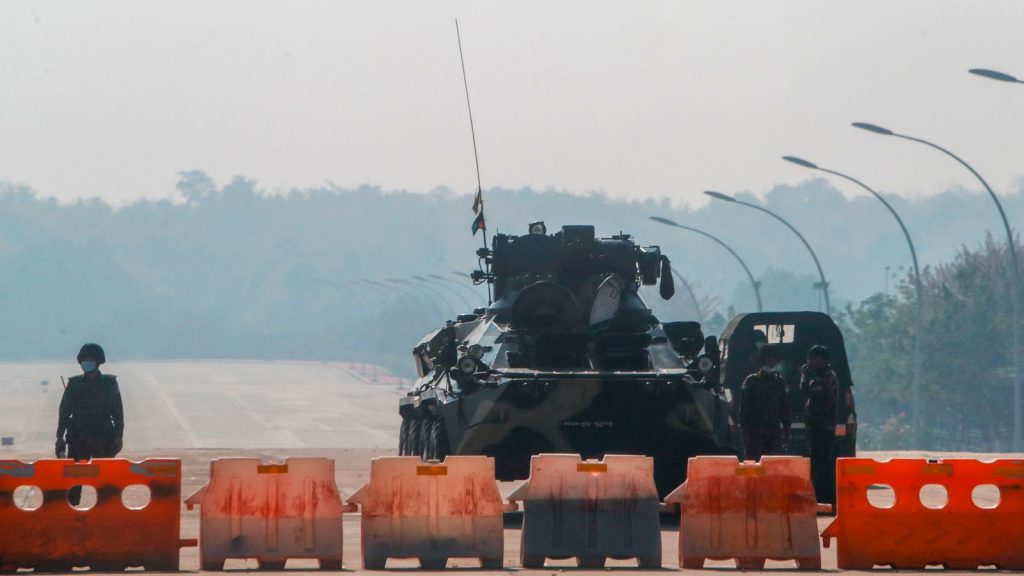People in Myanmar woke up February 1 to see the country’s hybrid democracy suffer a body blow with the generals taking over the administration in a coup. The citizens had learnt to live with military rule for decades, but they thought it was a thing of the past after a diluted form of democracy was introduced and elections were held in 2015. But, military dictatorship is back again with the junta declaring a state of emergency for one year after detaining the State Counsellor and de facto ruler Aung San Suu Kyi, President Win Myint and other high ranking leaders of the National League for Democracy (NLD) headed by Suu Kyi.
This followed widespread communications blackouts and banks too were shut due to severe disruption of internet services. Later in the day, the military announced that 24 ministers and deputies had been removed, and 11 replacements named, including finance, health, interior and foreign affairs.
Significantly, the coup took place hours before the first session of the new parliament was set to open and power was handed over to army chief Min Aung Hlaing. The specious plea taken by the military for the coup is alleged voting irregularities in the election of November, 2020 when the NLD secured 83 per cent of votes winning 396 of 476 seats against the military-backed Union Solidarity and Development Party’s tally of 33 seats. The situation had been worsening for the past few weeks when the air was rife with rumours about a possible coup. People’s worst fears did come true.
The coup has taken many by surprise since the military already wields significant power. In 2008, the ruling junta drafted a constitution that stipulates the military controls 25 per cent of legislative seats apart from overseeing key ministries, including defence and home affairs. In addition the junta – Tatmadaw – has a veto power on constitutional issues. It’s puzzling the world how the military that wrote the constitution bestowing upon itself enormous powers – both political and economic – needed to overthrow the government.
The military had alleged that the general elections held in November 2020 were fraught with irregularities and that the results – landslide victory for NLD – were not valid. It questioned the veracity of some 9 million votes cast in the election.
The military had demanded that the United Elections Commission (UEC) of Myanmar which oversees elections, or the government, or outgoing parliamentarians prove at a special session before the new parliament convened on February 1, that the elections were free and fair. The demand was rejected outright. This was almost an echo of Trumpism. The just ousted US President Donald Trump had shown to the world how to call legitimate people’s mandate a fraud and set hooligans on legislators about to validate the results in the Capitol.
While some countries have condemned the military takeover, demanding the popular mandate in favour of the NLD be honoured, the most favoured leader of Myanmar, Suu Kyi, cannot escape her share of blame for the situation. It is she who once described the military generals of her country as “sweet” and defended them in the International Court of Justice when they were facing charges of genocide, ethnic cleansing and rape of Rohingya women in the Rakhine district. Over 700,000 Rohingya Moslems had to flee the country and take shelter in refugee camps in Bangladesh to escape persecution by the state machinery. Suu Kyi did not cover herself with glory when she declined to attach any importance to the Rohingyas. She infamously said she was not a human rights activist, but a politician. Such a stance did not go well with her reputation as a winner of Nobel Peace Prize. Now, she ended up being a politician who could not protect her people nor could she placate the military well enough.
The coup has a corruption angle too. The military’s reassertion of authority will prolong the power of Min Aung Hlaing, who was to retire as army chief this summer. His alleged patronage network, centering around lucrative family businesses, could well have been undermined by his retirement. Moreover, the NLD has pledged to introduce new provisions in the constitution to free the country from the stranglehold of the army, though this is easier said than done given the army’s control over constitutional matters.
The USA and European countries have threatened to impose sanctions on Myanmar unless democracy is restored. But this may not prove to be a strong deterrent since the junta has the backing of China which has dominated the building of dams, pipelines and energy projects in Myanmar. The Chinese telecommunications giant Huawei is building Myanmar’s 5G telecommunications networks over US objections.
No wonder China’s spokesperson Wang Wenbin said China hoped “all parties in Myanmar will properly handle their differences under the constitutional and legal framework and maintain political and social stability.”
Myanmar’s tryst with a fragile democracy comes to an end, at least for now.
